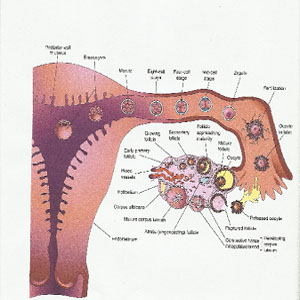FREQUENTLY ASKED QUESTIONS
The man's role in conception is the production and ejaculation of sperm cells. To achieve conception, a man must be capable of producing adequate numbers of swimming (motile) sperms with normal shape. Millions of sperms are required because only a few of these sperm cells will in the end reach the egg, and only one will actually enter and fertilize it.
During puberty, the testes become active and start to produce sperms. From his teens until about the age of 70, a man will typically produce 5,000 sperm cells every minute. Ejaculation produces semen, which is a mixture of two per cent sperm cells and 98 per cent liquid produced by the glands in and near the testes and penis.. Production of sperm is under the control of FSH and LH, the same hormones that control the woman's fertility.

Fertilization only happens if intercourse takes place almost around the time of ovulation. Ovulation only takes place once in every menstrual cycle, which means that there are only a few days each month when a woman can become pregnant. However, intercourse and ovulation don't need to be at exactly the same time as healthy sperms can survive for about 48 to 72 hours inside a woman's body and a woman's egg lives for about 12 to 24 hours after ovulation.
Fertility is therefore a result of sperm and egg meeting each other almost immediately after ovulation. Ovulation occurs 14 days before the onset of a period. This is reasonably predictable if the cycle is regular, but may be very unpredictable if the cycle is irregular.
DIAGRAM OF OVULATION, FERTILIZATION TO IMPLANTATION
Natural conception thus requires that the balance and functions of the various hormones must be correct to ensure an egg develops and ovulates normally. Intercourse must take place during the fertile part of the cycle. There must be an adequate number of motile normal sperms and no mechanical barrier such as blocked Fallopian tubes, which may prevent sperm reaching the egg
Many couples think that it is easy to have a child and are often surprised and disappointed when the woman does not get pregnant as soon as they start trying for a baby. The chance of getting pregnant in each menstrual cycle (each month) is calculated to be one in four for an average fertile couple. However, it may take a long time to conceive, even if everything is normal. Eight out of every ten (80%) women trying for a baby will become pregnant within the first year. About 25% will conceive within the first month,60% within six months, 75% by nine months, and 90% by eighteen months.Women who do become pregnant without any medical assistance generally do so within two years of trying.
It is common for couples to seek help and advice if there is difficulty conceiving. Overall, around 15 per cent (one in six) of all couples will seek help. The point at which they may want to seek help will depend on various factors. For example, if they are over 35 years of age or if they have any worrying symptoms, such as infrequent periods, the couple should seek help after about six months of trying.
From the above it is clear that a couple will not achieve natural conception if any of the following occurs:
1. The reproductive organs were partially or wholly not formed during fetal life( in the mother’s womb). This is very uncommon ,but can occur naturally or due to medications taken by the mother in early pregnancy.
2. Surgical removal of the womb , tubes or ovaries to treat a disease condition such as fibroid, cancer, or ectopic pregnancies ( affecting the fallopian tubes)
3 .Blockage of both Fallopian tubes. This is mostly due to pelvic infections including those following abortion.
4 .Destruction of the ovaries by infection, radiation or autoimmune condition
5 .Diseases or malfunction of the pituitary or the hypothalamus from various causes
6 .Lack of or inadequate sperms resulting from:
- . Any condition that affects the testes and prevents sperm production( such as mumps infection, trauma, multiple dilated veins around the testes-called varicocele, undescended testes,. cancer, autoimmune condition. hypothalamus or pituitary diseases or malfunction, excessive heat, excessive alcohol intake, smoking, hard drugs )
7. Blockage of the sperm channel into the penis
8 .Inability to attain erection and deposit the semen into the vagina
9. There are many more causes of infertility.
WHERE TO SEEK HELP
The Trustcare Specialist Hospital Fertility Centre , TRUFERT, has all the services and equipment/machines which,by the Grace of GOD, can help you achieve pregnancy and bring peace , harmony and happiness to your home and extended family. We have already delivered several IVF babies. Above all have faith in God
Many couples think that it is easy to have a child and are often surprised and disappointed when the woman does not get pregnant as soon as they start trying for a baby. The chance of getting pregnant in each menstrual cycle (each month) is calculated to be one in four for an average fertile couple. However, it may take a long time to conceive, even if everything is normal. Eight out of every ten (80%) women trying for a baby will become pregnant within the first year. About 25% will conceive within the first month,60% within six months, 75% by nine months, and 90% by eighteen months.Women who do become pregnant without any medical assistance generally do so within two years of trying.


